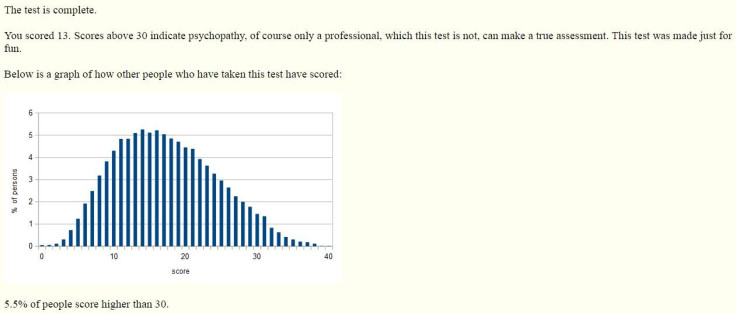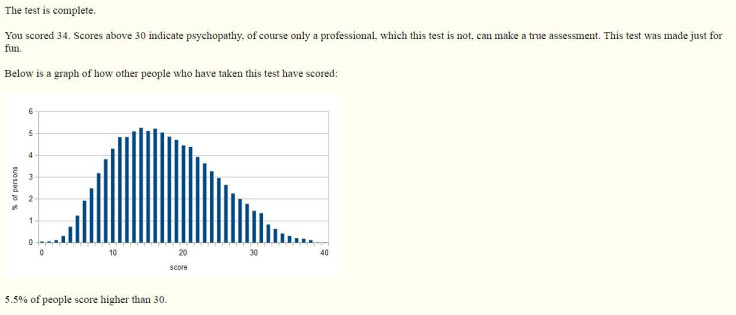Am I A Psychopath? Here’s How To Spot Someone With The Social Personality Disorder

Jeffrey Dahmer confessed to killing 17 people between 1978 and 1991, and was found to have dismembered, photographed, and eaten victims. In the 16th to 17th centuries, Countess Elizabeth Bathory in Hungary brutally tortured and murdered dozens of people before being brought to justice, despite common knowledge of her being a “Blood Countess.” German doctor Josef Mengele, “the Angel of Death,” performed horrifying experiments on live Auschwitz extermination camp prisoners during the Holocaust. And Patrick Bateman, from the movie American Psycho, told his coworkers that he was returning video tapes when he was actually on his way to murder people.
Those people were all psychopaths. Are you one too?
Psychopathy is a psychological disorder in which seemingly charming, normal people actually have no conscience or empathy, “making him manipulative, volatile and often (but by no means always) criminal,” Psychology Today explains. “Psychopathy is among the most difficult disorders to spot” and part of what makes it so scary is that adults found to be psychopaths are “largely impervious to treatment, though programs are in place to treat callous, unemotional youth in hopes of preventing them from maturing into psychopaths.”
Scientists have considered the role of the amygdala — which is associated with emotional reactions and decision-making — in a psychopathic brain, especially as it seems psychopaths have less function in that region, but the source of the condition is not known.
According to Live Science, psychopaths comprise about 1 percent of the population — although they account for about a quarter of the federal male prison population.
This disorder is not to be confused with sociopathy or narcissism, which are terms that are sometimes used interchangeably because of their similarities to psychopathy. While both psychopathy and sociopathy are extreme forms of antisocial personality disorders, sociopathy is caused by social or environmental factors, Psychology Today says, “whereas psychopathic traits are more innate, though a chaotic or violent upbringing may tip the scales for those already predisposed to behave psychopathically.” Narcissism, on the other hand, although it involves charming or charismatic yet manipulative and volatile people, is characterized by extreme vanity and selfishness — that person will crave admiration and feel superior to all others.
Psychopaths tend to be violent; disregard laws, social rules and the feelings of others; be unable to form emotional attachments; and be manipulative, easily gaining the trust of others. “They learn to mimic emotions, despite their inability to actually feel them, and will appear normal to unsuspecting people,” Psychology Today says. “Psychopaths are often well educated and hold steady jobs. Some are so good at manipulation and mimicry that they have families and other long-term relationships without those around them ever suspecting their true nature.”
Scientific American describes psychopaths as “self-centered, dishonest and undependable, and at times they engage in irresponsible behavior for no apparent reason other than the sheer fun of it.” They will have shallow romantic relationships and place blame on others for their actions.
Above all else, Psychology Today says, “unlike their sociopathic counterparts, psychopathic criminals are cool, calm, and meticulous” — when they commit crimes, they plan every detail and are often much more difficult to catch.
Psychopaths aren’t just murderers, however. Criminal psychologist Robert Hare, the inventor of the standard clinical test for psychopathy, with another researcher studied corporate professionals and found that some “scored sufficiently highly ... to be evaluated for psychopathy,” the Telegraph reported. “It’s easy to see how a lack of moral scruples and indifference to other people’s suffering could be beneficial if you want to get ahead in business.”
The clinical test measures traits like a potential psychopath’s sense of self-worth, propensity to lie, ability to feel remorse, quality of interpersonal relationships, and tendency to feel bored, among others. There are a number of free self-tests online that imitate the original, but they are easy to beat, especially for someone who is a charmer and a liar. This reporter took a test found in the top Google result and truthfully answered the questions about competitive drive, temper and patience, empathy and companionship, and scored a 13 out of 40 (the cutoff for psychopaths is 30 and above). But after taking the test just moments later in an effort to earn the label of "psychopath," the score was 34.
Different self-tests provide different results, but if you’re taking one in earnest, with legitimate concern that you’re a psychopath, you likely have no reason to worry.





























